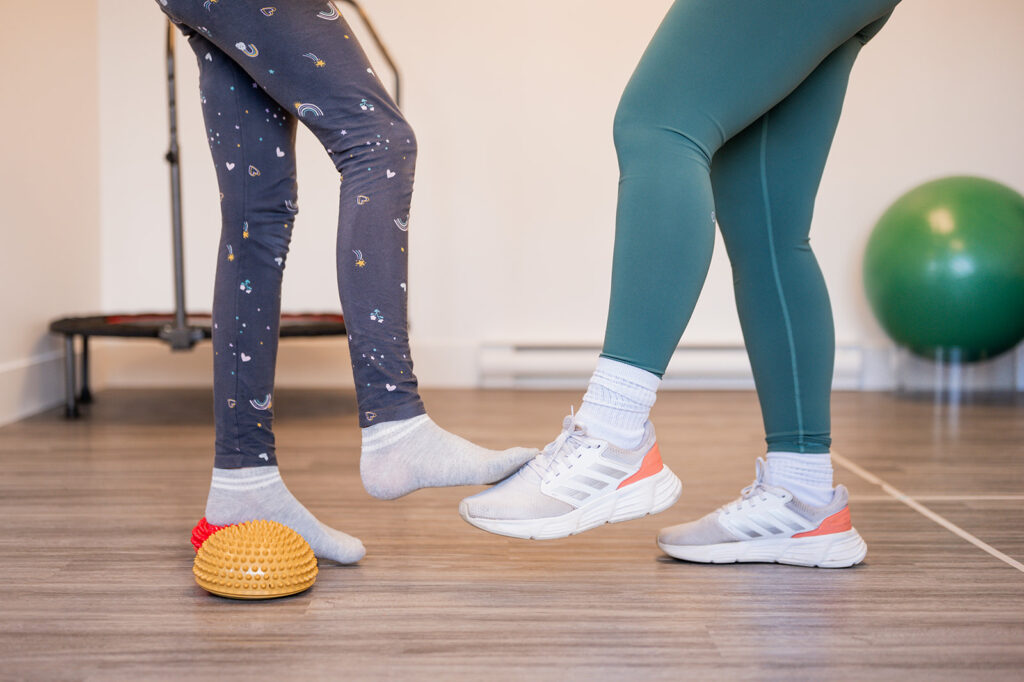Fundamental Movement Skills (FMS) are the basic building blocks of physical activity, providing children with the essential abilities needed to engage in various sports and everyday movements. For parents of children with diverse needs, understanding and supporting the development of these skills are crucial steps in promoting their overall well-being and participation in physical activities.

What Are Fundamental Movement Skills (FMS)?
Fundamental Movement Skills encompass a diverse range of foundational movements that form the basis for more complex physical activities. These skills are broadly categorized into locomotor skills (e.g., running, jumping), object control skills (e.g., throwing, catching), and stability skills (e.g., balancing, crawling). Developing proficiency in FMS is essential for children as it sets the stage for their physical literacy and overall development.
What are they?
- Locomotor Skills
- Running
- Jumping
- Hopping
- Galloping
- Skipping
- Sliding
- Object Control Skills
- Throwing
- Catching
- Kicking
- Striking (with hands, racquets, bats, etc.)
- Dribbling (with hands or feet)
- Rolling (e.g., rolling a ball)
- Stability Skills
- Balancing
- Climbing
- Crawling
- Rolling (as in gymnastics)
- Twisting
- Bending
Why Are They Important?
The development of Fundamental Movement Skills is critical for children’s physical, cognitive, social, and emotional development. Proficiency in FMS not only enables children to participate in sports and physical activities but also enhances their confidence, coordination, and overall fitness levels. Additionally, mastering these skills lays the groundwork for a lifelong enjoyment of physical activity and promotes a healthy lifestyle.
Barriers For Kids
Children with diverse needs may face various barriers to developing Fundamental Movement Skills. These barriers can include physical disabilities, sensory processing issues, lack of access to inclusive programs or equipment, and limited opportunities for skill development. Addressing these barriers is essential to ensure that all children have the opportunity to participate in physical activities and develop their movement skills.
What Is Developmental Delay?
Developmental delay refers to a significant lag in a child’s physical, cognitive, social, or emotional development compared to their peers. It can manifest in various ways, including delays in reaching developmental milestones, difficulties with motor skills, and challenges in communication or social interaction. Early identification and intervention are crucial for supporting children with developmental delays and helping them reach their full potential.
How To Support Developmental Delay?
Parents can play a vital role in supporting their child’s development, including their Fundamental Movement Skills, by providing a supportive and nurturing environment. This can involve seeking early intervention services, collaborating with healthcare professionals and therapists, adapting activities to meet their child’s needs, and providing opportunities for practice and exploration in safe and inclusive settings.
Supporting a child with developmental delay involves a multi-faceted approach that addresses their unique needs and challenges. Here are some strategies parents can use to support their child’s development, with a focus on how physical therapy (PT) and occupational therapy (OT) can greatly benefit:
- Early Intervention Services:
- Early intervention services are crucial for identifying and addressing developmental delays as early as possible. Parents should seek evaluation and assessment services through their pediatrician or early intervention programs if they suspect their child may have delays.
- Collaboration with Healthcare Professionals:
- Working closely with healthcare professionals, including pediatricians, Physiotherapists (PT), Occupational Therapists (OT), and other specialists, can provide valuable insights and guidance on supporting a child’s development. These professionals can offer tailored strategies and interventions to address specific areas of delay.
- Individualized Treatment Plans:
- PTs and OTs can create individualized treatment plans tailored to a child’s unique strengths and challenges. These plans may include targeted exercises, activities, and interventions aimed at improving motor skills, coordination, sensory processing, and overall functional abilities.
- Sensory Integration Therapy:
- OTs specialize in sensory integration therapy, which helps children with developmental delays improve their ability to process and respond to sensory information. This can be especially beneficial for children with sensory processing disorders or sensory sensitivities.
- Play-Based Interventions:
- PTs and OTs often use play-based interventions to engage children in therapeutic activities that promote skill development in a fun and interactive way. Play is an essential tool for fostering motor skills, social interaction, and cognitive development.
- Home Exercises and Activities:
- PTs and OTs can provide parents with home exercises and activities to supplement therapy sessions and promote ongoing skill development. Consistent practice at home can reinforce skills learned in therapy and facilitate progress over time.
- Environmental Modifications:
- Making environmental modifications at home and in other settings can help accommodate a child’s needs and promote independence and participation. This may include adjusting furniture arrangements, providing adaptive equipment or assistive devices, and creating sensory-friendly spaces.
- Parent Education and Support:
- PTs and OTs can offer valuable education and support to parents, empowering them to advocate for their child’s needs and implement strategies for supporting development. Parent education may include guidance on developmental milestones, adaptive techniques, and strategies for managing challenges.
By incorporating PT and OT interventions into a comprehensive support plan, parents can play an active role in promoting their child’s development and maximizing their potential. These therapies offer specialized expertise and resources that can significantly benefit children with developmental delays, helping them overcome obstacles and thrive in various aspects of life.
In conclusion, understanding and supporting the development of fundamental movement skills are essential for children with diverse needs. By recognizing the importance of FMS, addressing barriers, and providing appropriate support and resources, parents can empower their children to thrive physically, cognitively, and emotionally.
Frequently Asked Questions
Q: What are Fundamental Movement Skills?
A: Fundamental Movement Skills (FMS) are basic movement patterns that form the foundation for more complex and specialized movements used in various physical activities and sports. These skills include locomotor skills (e.g., running, jumping), object control skills (e.g., throwing, catching), and stability skills (e.g., balancing, crawling).
Q: Why are Fundamental Movement Skills important?
A: Fundamental Movement Skills are important because they contribute to a child’s overall physical literacy, which is the ability to move with competence and confidence in a wide variety of physical activities. Proficiency in FMS promotes physical fitness, enhances coordination and motor skills, fosters confidence and self-esteem, and lays the groundwork for a lifelong enjoyment of physical activity.
Q: What are the different categories or types of Fundamental Movement Skills?
A: The different categories of fundamental movement skills include:
- Locomotor skills: Running, jumping, hopping, galloping, skipping, sliding.
- Object control skills: Throwing, catching, kicking, striking (with hands, racquets, bats, etc.), dribbling (with hands or feet), rolling (e.g., rolling a ball).
- Stability skills: Balancing, climbing, crawling, rolling (as in gymnastics), twisting, bending.
Q: At what age should children typically develop Fundamental Movement Skills?
A: Children typically begin to develop fundamental movement skills in early childhood, with most skills emerging between the ages of 2 and 7 years old. However, the timeline for skill development can vary among children, and continued practice and refinement are necessary throughout childhood and adolescence.
Q: How can parents and caregivers support the development of Fundamental Movement Skills in children?
A: Parents and caregivers can support the development of fundamental movement skills by providing opportunities for active play, modeling movement behaviors, offering encouragement and praise, providing access to safe and age-appropriate equipment, and enrolling children in structured physical activity programs or classes.
Q: What are some common barriers to developing Fundamental Movement Skills in children?
A: Common barriers to developing fundamental movement skills in children include lack of access to safe play spaces, limited opportunities for active play and physical activity, sedentary lifestyles, physical disabilities or limitations, and environmental factors such as weather or community safety concerns.
Q: What role does physical education play in teaching Fundamental Movement Skills?
A: Physical Education (PE) programs play a crucial role in teaching fundamental movement skills by providing structured opportunities for skill development, instruction on proper technique and form, exposure to a variety of activities and sports, and opportunities for practice and reinforcement in a supportive and inclusive environment.
Q: How do Fundamental Movement Skills contribute to overall physical literacy?
A: Fundamental Movement Skills contribute to overall physical literacy by providing the foundation for more complex movement patterns and physical activities. Proficiency in FMS enhances a child’s ability to participate in a wide range of activities, promotes confidence and enjoyment in movement, and lays the groundwork for continued physical development and lifelong participation in physical activity.
Q: Are there specific exercises or activities that can help improve Fundamental Movement Skills?
A: Yes, there are many exercises and activities that can help improve fundamental movement skills. Examples include hopping games, throwing and catching drills, balance beam exercises, obstacle courses, dance classes, and sports-specific drills and practices tailored to the skill being developed.
Q: How do Fundamental Movement Skills relate to more advanced sports and physical activities?
A: Fundamental Movement Skills serve as the building blocks for more advanced sports and physical activities. Mastery of FMS provides the foundation upon which more specialized skills can be developed, allowing individuals to participate effectively and competently in a wide range of sports, games, and physical pursuits throughout their lives.






